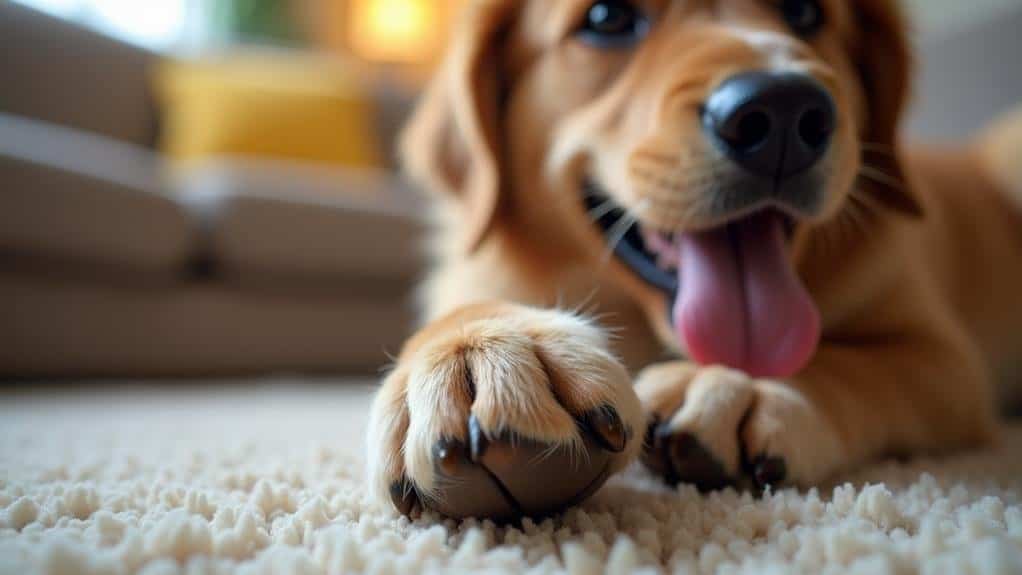Dogs bite their nails for various reasons, ranging from normal grooming to signs of underlying issues. It can be a response to overgrown nails, allergies, anxiety, or parasitic infestations. While occasional nail biting isn't usually concerning, persistent chewing may indicate health problems or compulsive behavior. Look out for symptoms like swelling, redness, or limping, which require veterinary attention. To address nail biting, provide chew toys, increase exercise, and use anti-chew sprays. Regular outdoor activities can naturally file down nails and reduce boredom-related chewing. If you're unsure about your dog's nail-biting habits, professional guidance can help uncover and resolve any underlying causes.
Common Causes of Nail Biting
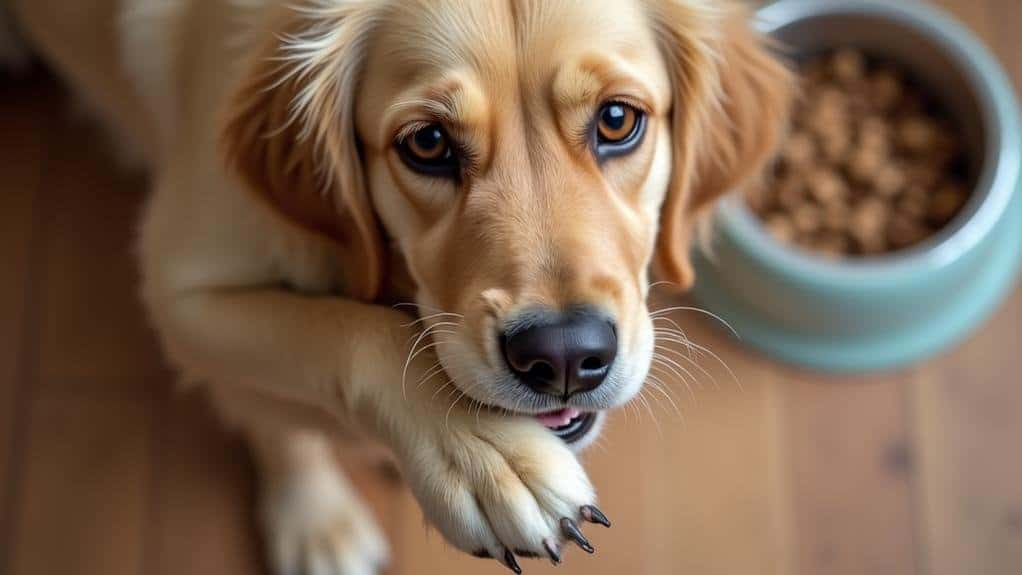
Paws tell a tale of discomfort when dogs start biting their nails. This behavior can stem from various common causes, ranging from simple grooming habits to more serious health concerns. If you notice your dog biting their nails frequently, it's important to take into account several factors.
Overgrown nails are a primary culprit. When a dog's nails are too long, they may chew them as part of their natural grooming behavior to alleviate discomfort.
Allergies, both environmental and food-related, can also trigger nail biting as dogs attempt to relieve itching and irritation.
Anxiety is another significant factor, often resulting from changes in routine or separation from owners. In these cases, nail biting serves as a coping mechanism for stress.
Parasitic infestations, such as fleas or ticks, can cause intense itching, leading dogs to bite their nails for relief.
It's vital to address these issues promptly, as habitual nail biting can develop into compulsive behavior over time.
Even after resolving the initial trigger, some dogs may continue this habit, requiring intervention to break the cycle.
Recognizing Serious Health Issues
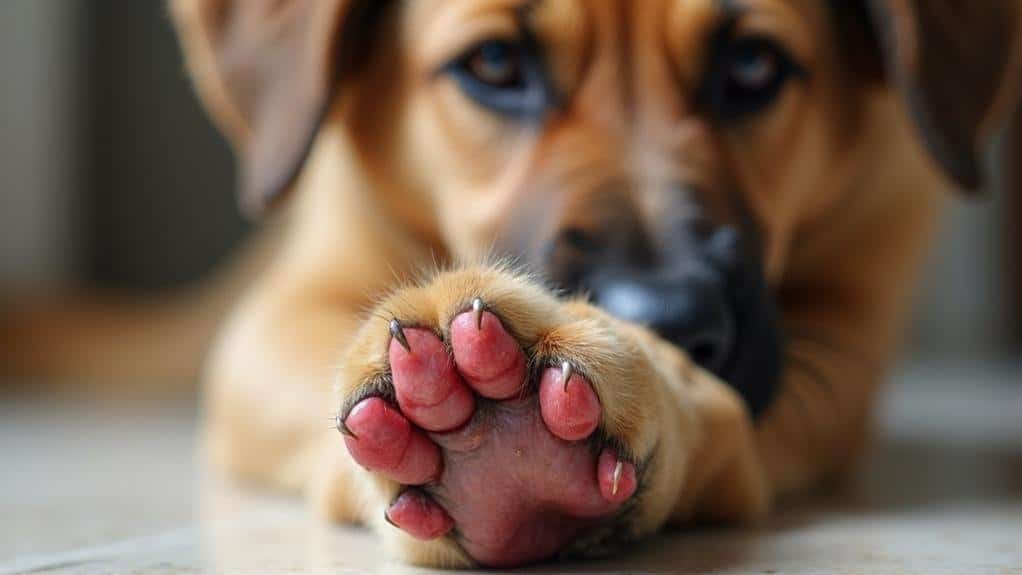
While nail-biting in dogs can be a common behavior, it's important to keep an eye out for signs that point to more serious health issues. If you notice swelling, redness, or a foul odor coming from your dog's paws, it could indicate an infectious problem that requires immediate veterinary attention.
These symptoms, along with the presence of pus, suggest potential bacterial or fungal infections that need prompt treatment.
Pay close attention to your dog's behavior. If they're limping or showing reluctance to put weight on their paws, it's a clear sign of discomfort that warrants a professional diagnosis.
Persistent nail biting may also be a sign of distress, pointing to underlying health concerns that shouldn't be ignored.
Don't hesitate to seek a consultation with your vet if you observe any of these symptoms. Early intervention is vital in preventing the worsening of health issues and improving your dog's overall well-being.
Remember, the skin and paw pads are sensitive areas, and any changes in appearance or behavior should be taken seriously.
Effective Solutions for Nail Biting
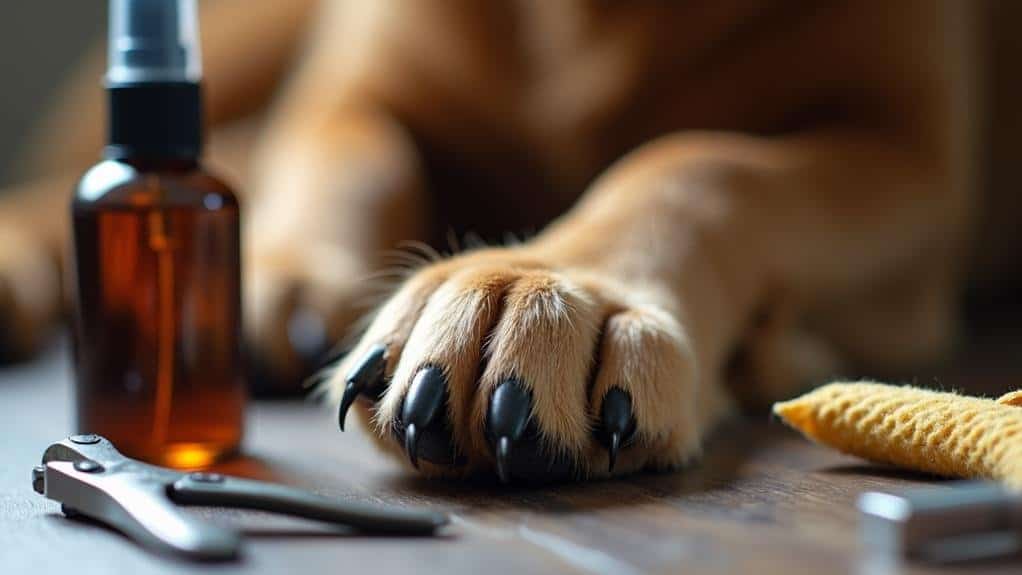
A dog's nail-biting habit can be frustrating, but there are several effective solutions to address this behavior.
To help your furry friend overcome this issue, consider implementing these strategies:
- Provide chew toys or bones to redirect their chewing instinct
- Increase regular exercise to maintain nail length naturally
- Rinse your dog's paws after walks to remove irritants
- Apply anti-chew sprays to discourage nail biting
- Engage in obedience training or doggie daycare for mental stimulation
Exercise and Nail Health
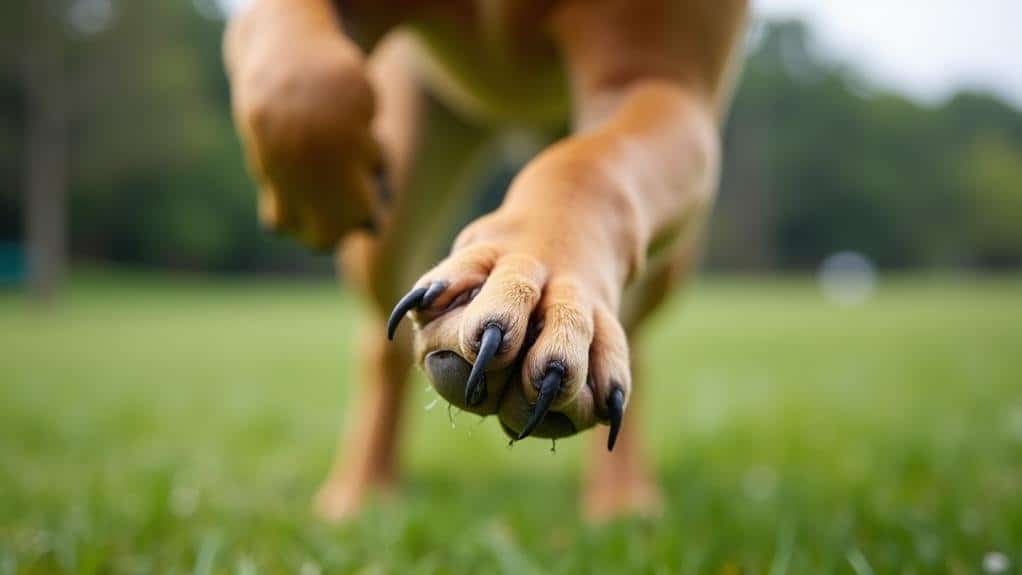
Regular exercise plays an essential role in maintaining your dog's nail health and can greatly reduce nail-biting behavior. When you engage your furry friend in physical activities, you're not just promoting their overall well-being but also naturally filing down their nails. This process helps prevent discomfort that might lead to compulsive nail biting.
Outdoor activities like running or playing fetch are particularly beneficial for your dog's nail health. These exercises subject their nails to natural wear and tear, reducing the likelihood of nail-related issues.
Additionally, regular physical activity combats boredom, a common trigger for destructive habits such as nail chewing.
Exercise isn't just good for your dog's body; it's great for their mind too. A well-exercised dog is typically more relaxed and less prone to anxiety, which can contribute to nail-biting behavior.
Professional Help and Resources
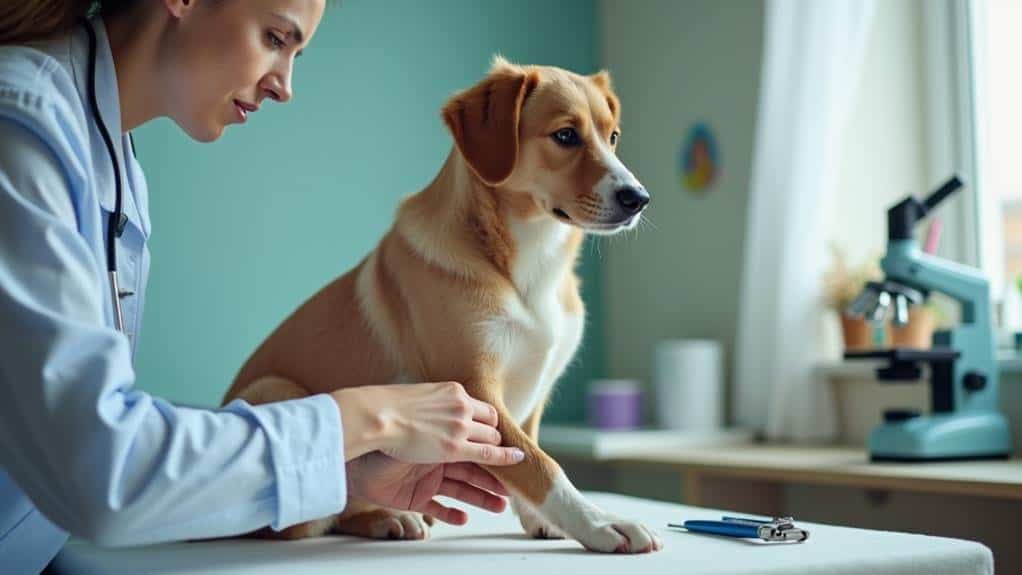
When exercise and home remedies aren't enough to curb your dog's nail-biting habit, it's time to seek professional help.
Veterinary professionals can diagnose and treat underlying medical issues that may be causing your pet's behavior, such as infections or allergies. They'll provide ongoing support tailored to your dog's specific needs.
Professional trainers offer behavioral assessments and customized training plans to address anxiety or compulsive nail-biting. They'll use positive reinforcement techniques to help your dog overcome this habit.
Consider enrolling in obedience courses, like those offered by Ruffgers, to effectively manage destructive behaviors.
Here are some key points to remember when seeking professional help:
- Consult a veterinarian to rule out medical causes
- Work with a professional trainer for behavioral issues
- Enroll in obedience courses for thorough training
- Schedule regular check-ups for ongoing support
- Consider pet insurance to cover treatment costs
Frequently Asked Questions
Why Does My Dog Bite His Nails so Much?
Your dog's nail-biting could be due to various factors. It might be discomfort from overgrown nails, allergies causing itching, anxiety, or parasites. It's also possible it's become a habit. You should monitor and address the behavior.
What Does Dog Nail-Biting Mean?
Your dog's nail-biting can mean several things. It's often a sign of discomfort, anxiety, or boredom. It might indicate overgrown nails, allergies, or infections. Sometimes, it's a habit or attention-seeking behavior. Monitor for other symptoms and consult your vet if concerned.
What Does It Mean When Dogs Constantly Bite Their Paws?
If your dog's constantly biting its paws, it's likely experiencing discomfort. It could be due to allergies, infections, or injuries. Behavioral issues like anxiety may also be the cause. You'll want to consult a vet for proper diagnosis and treatment.
What Does It Mean When Your Dog Keeps Biting Your Fingers?
When your dog keeps biting your fingers, it's often playful behavior or a way to seek attention. However, it could also indicate teething discomfort in puppies or stress in older dogs. Consider the context to understand their motivation.
Conclusion
You've learned that dogs bite their nails for various reasons, from boredom to serious health issues. It's essential to observe your pup's behavior and address any underlying problems. Remember, regular exercise and mental stimulation can help curb this habit. If you're concerned, don't hesitate to consult your vet. With proper care and attention, you can help your furry friend maintain healthy nails and overall well-being. Stay vigilant and proactive in your dog's nail health.

